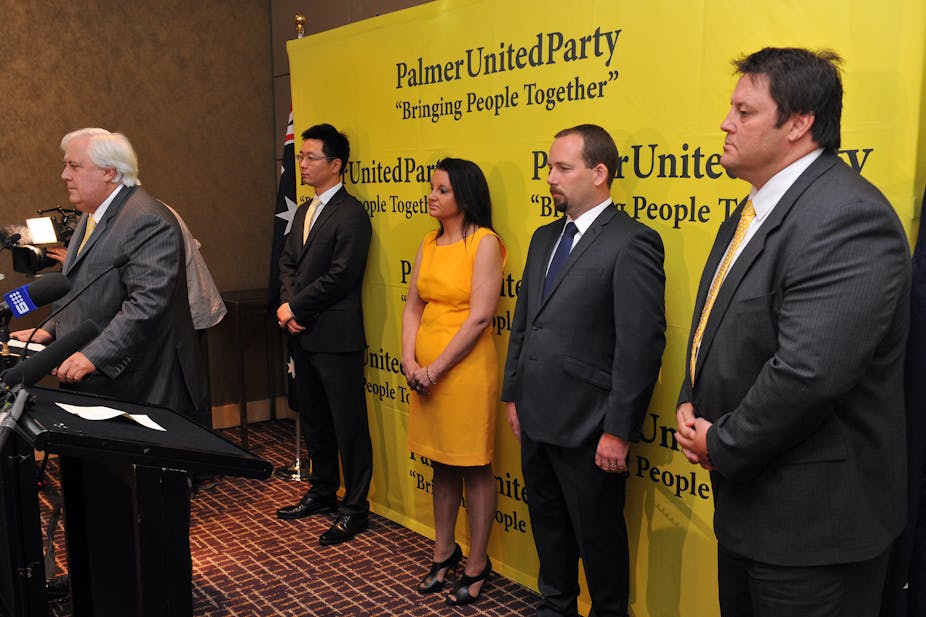The 2013 Senate election was a triumph for new minor parties as complex preference deals catapulted them from obscurity and into federal parliament. While all these small party senators - in addition to the established parties - will have an impact on government legislation, one group is shaping to be a major player in the new Senate.
Perhaps the most significant player in the new Senate will be the Palmer United Party, which had a major impact on the 2013 election result. Created by mining magnate Clive Palmer, the party won three Senate seats and Palmer himself appears to have been successful in the lower house seat of Fairfax, though there is currently a recount to verify the result.
Palmer has a lengthy history in Coalition politics. He was Queensland premier Joh Bjelke-Petersen’s media spokesman in the 1980s and backed the “Joh for Canberra” campaign in 1987. Following a fallout with the National Party on concerns about the Queensland government’s economic policies in 2012, Palmer launched his new party in April this year.
Evidence of Palmer’s political shrewdness was on show today, when he announced that his party has made a deal with senator-elect Ricky Muir from AMEP to vote together in parliament. Palmer has taken advantage of the AMEP’s fragmentation in recent days. In doing so, he has increased the power of his nascent party in Australian politics. Taking a leaf from the lower house independents from 2010, Palmer recognised that presenting as a cohesive group would enhance the potential to influence policy.
The deal organised by Palmer may also work to marginalise the power of the remaining crossbenchers. Instead of having to work with individual senators, the Abbott government now has the option of negotiating with the “Palmer Four”, while knowing that it will need to convince only two of the remaining crossbenchers.
When the new Senate is sworn in next July next year, the Coalition will hold 33 seats; Labor will have 26 and the Greens nine in the chamber of 76. However, a recount is pending in the Western Australian Senate race, which may see defeated Greens senator Scott Ludlam return to the upper house. In order to pass legislation, the government will need the support of at least six crossbench senators.
This is not an unusual outcome in Australian politics. Indeed, the purpose of the Senate is to be a check on the government of the day, and governments in the post-war period have often had to negotiate with crossbench senators to get their policies through.
Arguably it was the Australian Democrats that operated with the explicit notion of keeping the major parties accountable for their decisions. With their famous “keep the bastards honest” mantra, the Democrats sought to review and improve legislation rather than dogmatically seek to advance an ideological position. This meant that Labor and Coalition governments had to engage in extensive negotiations to get the Democrats’ support.
Therefore, the prospect of working with a crossbench should not be seen as a disaster for prime minister Tony Abbott. In fact, the Senate may act as a safety valve for the government by removing contentious elements from proposed legislation.
A burning issue about the new Senate is anticipating how the newly elected crossbenchers will vote. There will be a couple of familiar figures in this group. John Madigan from the Democratic Labor Party returns to complete the remaining three years of his initial term, while South Australian senator Nick Xenophon has just won another six years in the Senate. Representatives of the Family First, Liberal Democrat, Palmer United and the Australian Motoring Enthusiast (AMEP) parties will be the new faces joining the crossbench in July next year.
Bob Day, Family First’s senator-elect from South Australia, may follow the model set by Victorian Steve Fielding who represented the party in the Senate from 2005 to 2011. The party advanced an agenda of social conservatism while opposing measures concerned with fertility control and same-sex marriage.
Fielding was also adept at generating publicity about various social issues such as the need to raise the pension, as well as the merits of having a national bottle recycling scheme. An important feature of Fielding’s time in the Senate was that he did not weld himself to either party.
In contrast, the Liberal Democrats are an untested entity. The party’s senator-elect, David Leyonhjelm, has reportedly been a member of Young Labor and the Liberal Party, leaving to join the Shooters Party after the Howard government banned semi-automatic weapons following the Port Arthur massacre. More recently, he flagged his interest in imposing tariffs for asylum seekers.
Leyonhjelm may seek to relax gun laws while in the Senate. This may be a bargaining chip for the new party, especially as it has indicated that it would be unwilling to support Abbott’s parental leave scheme.
The new Senate will be a challenge for the government, but Palmer’s actions have slightly reduced the complexity facing the Abbott government in the Senate. In return, Palmer could become an even more influential figure on government policies and further strengthen his party’s position in Australian politics.

